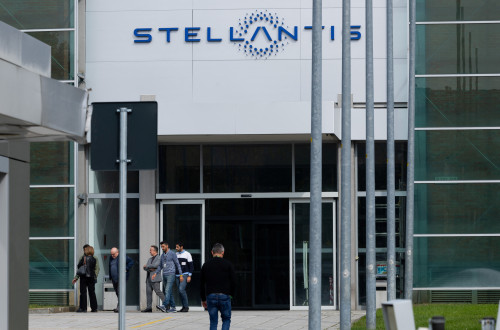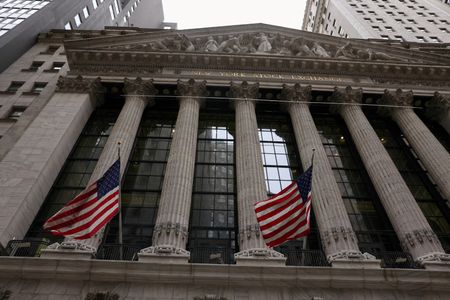 1
1 1
1

By Devik Jain and Sabahatjahan Contractor
(Reuters) – Gains in financial and healthcare shares bolstered the Dow and the S&P 500 index on Monday, as investors pinned their hopes on Russia-Ukraine peace talks, while shifting their focus to the upcoming Federal Reserve policy meeting.
The conflict has roiled global financial markets and fueled concerns about runaway inflation as prices of oil and other commodities skyrocket in the face of tough Western sanctions against Russia.
Talks between Ukraine and Russia paused on Monday and will continue on Tuesday, one of Kyiv’s negotiators said on Twitter.
Ukraine had begun “hard” talks with Russia on a ceasefire, immediate withdrawal of troops and security guarantees, despite the fatal shelling of a residential building in Kyiv.
“We clearly have done a lot of multiple contraction across the board. You have this market that’s going to continue to be held hostage by the headlines coming out of Russia-Ukraine,” said Art Hogan, chief market strategist at National Securities.
“Energy prices have pulled back a bit and that helps mitigate some of the inflation fears. The Federal Reserve is likely to have that first rate increase and getting that behind us will likely be a positive but that’s not until Wednesday.”
At 11:43 a.m. ET, the Dow Jones Industrial Average was up 240.53 points, or 0.73%, at 33,184.72, the S&P 500 was up 4.40 points, or 0.10%, at 4,208.71, and the Nasdaq Composite was down 114.83 points, or 0.89%, at 12,728.98.
Seven of the 11 major S&P sectors advanced, with financials leading the pack on a 2% gain, followed by the healthcare sector.
Bank of America rose 3%, while the broader banks index added 2.6%, in line with a surge in U.S. Treasury yields ahead of what is expected to be the Fed’s first rate hike in three years at its March 15-16 meeting to try to tame soaring inflation. [US/]
Traders see a 91% chance of a 25-basis-point hike later this week. [IRPR]
“They are telling that it’s being priced in that the Fed is beginning its rate increases and that banks will benefit from that,” said Kim Forrest, chief investment officer at Bokeh Capital Partners in Pittsburgh.
“The banks are there not just to hold money but to lend money and having a higher interest rate will let them make money.”
Tech-heavy Nasdaq fell as shares of Apple Inc slipped 1.7% after its supplier Hon Hai Precision Industry Co Ltd, known as Foxconn, suspended operations in China’s Shenzhen amid rising COVID-19 cases.
Pfizer Inc and Moderna Inc jumped 4% and 12.7%, respectively, leading the group of COVID-19 vaccine makers.
Energy shares slid, with Occidental Petroleum down 3.3%, as Brent crude fell below $110 a barrel, just a week after it scaled as much as $139 due to the Ukraine crisis. [O/R]
The CBOE volatility index, also known as Wall Street’s fear gauge, rose to its highest level since March 9.
Declining issues outnumbered advancers for a 1.56-to-1 ratio on the NYSE and for a 1.84-to-1 ratio on the Nasdaq.
The S&P index recorded 10 new 52-week highs and 18 new lows, while the Nasdaq recorded 20 new highs and 366 new lows.
(Reporting by Devik Jain and Sabahatjahan Contractor in Bengaluru; Editing by Saumyadeb Chakrabarty and Anil D’Silva)